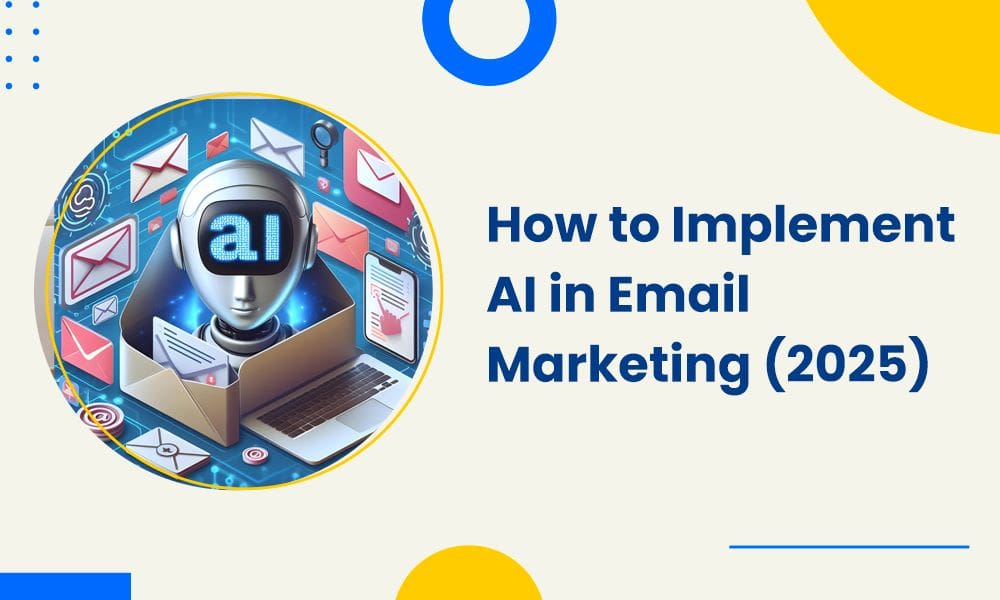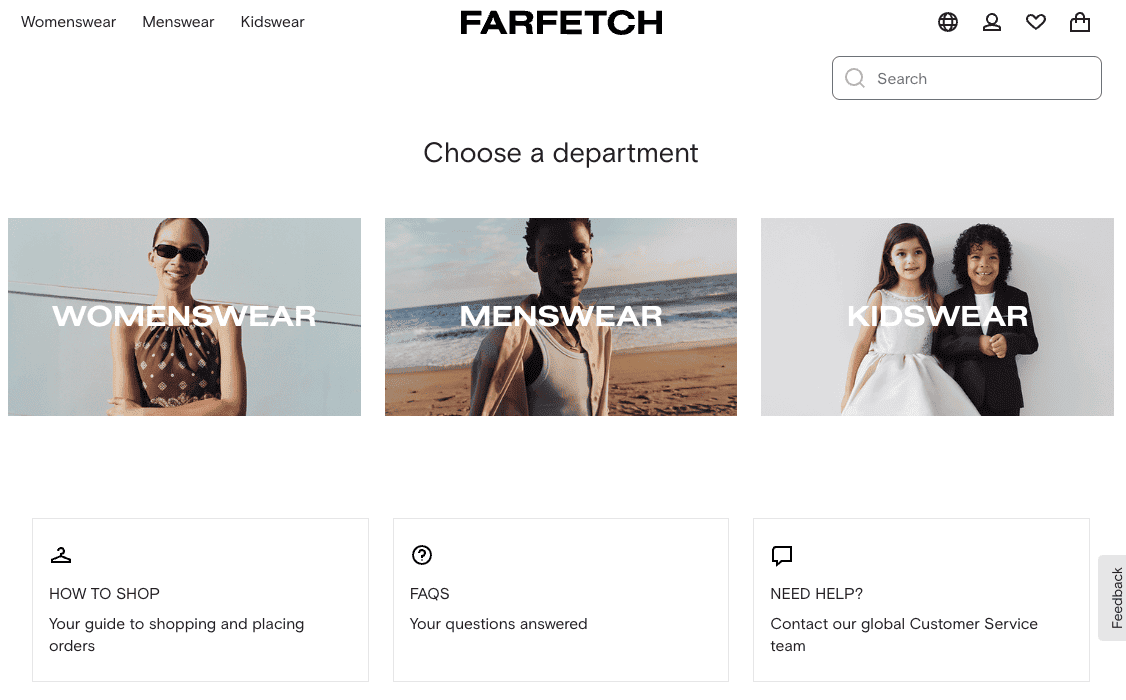333.2 billion emails are sent and received daily. With the current winds, the use of AI has become frequent, especially in marketing automation. With more than 80% of marketers already leveraging some form of AI in their marketing strategies, those who don’t embrace this technology risk falling behind.
But AI is not only for the big players. It applies to businesses of all sizes, and those who have embraced it are reaping the benefits.
AI is revolutionizing email marketing by facilitating hyper-personalization and predictive analytics, among other operations. This ensures that companies can send the right message to the right person at the right time.
So, if you’re ready to move your email marketing to another level and stun your competition out of nowhere, then gather yourself. We want to take you on a ride into AI-powered email marketing, where you will learn some tips that make campaigns unstoppable.
Table of Contents
Key Takeaways
- Employing AI in email marketing results in achieving scale personalization, enhanced segmentation, and optimal delivery, leading to higher click-through and conversion rates.
- AI automates A/B testing, content optimization, and campaign management, thus reducing time and costs while increasing general efficiency.
- The integration requires thoughtful consideration of data quality concerns, privacy issues, algorithmic bias incorporation into current procedures, and constant supervision/optimization.
- Small business owners looking to improve targeting, efficiency, and customer loyalty should consider AI options for email marketing activities based on the available resources and objectives.
- Businesses’ use of AI in email marketing will facilitate growth and ROI enhancement and enable them to remain competitive in an ever-increasing data-driven marketing space.
Understanding AI in Email Marketing
In email marketing, artificial intelligence (AI) refers to many different technologies that apply machine learning algorithms and big data to optimize and automate various aspects of an email campaign to improve efficiency and personalization.
Artificial intelligence researches subscribers’ behavior, such as liking patterns or engagement trends. It can also collect open rates, click-through rates (CTR), and conversion rates, among other metrics, thus leading to better audience segmentation regarding demographic characteristics.
This means one can anticipate future activities by the audience based on prior actions while utilizing a data-driven decision-making method. Consequently, strategies are more tailored to individuals’ needs.
Read also: AI Marketing Tools to Get Ahead of Your Competitors (2025)
Benefits of Using AI in Email Marketing
Consider some of the benefits of using AI in email marketing below.
1. Personalization at scale
Artificial intelligence allows marketers to simultaneously personalize email content across thousands or millions of recipients. AI algorithms process large amounts of subscriber data, generating customized emails for each subscriber. They personalize email subject lines, body content, product recommendations, and offers based on subscribers’ preferences, behavior, past interactions, etc.
Scaling personalization allows marketers to provide more targeted and engaging messages, leading to higher open rates, click-through rates, and conversions.
2. Improved segmentation and targeting
With AI-powered segmentation and targeting features, marketers can divide their mailing lists into different groups based on demographics, behavior, interests, and engagement levels.
AI algorithms identify commonalities among subscribers automatically, making it possible for marketers to group different people for targeted purposes.
This gives marketers power, as they can now send more relevant content to each segment, increasing their chances of resonating with subscribers or eliciting desired actions.
3. Optimized email delivery and timing
AI technology can optimize your delivery time, ensuring that your emails reach the intended audience when they are most likely to read them.
By analyzing historical data, subscriber timezones, email client usage patterns, past engagement, etc., AI algorithms can establish the best time slots suitable for sending out individual emails.
This increases the likelihood of emails being opened and engaged as they reach subscribers’ when they are most receptive.
4. Automated A/B testing and optimization
AI makes A/B testing and optimization easier for email marketing. Marketers can use AI-powered tools to automatically test various email elements, such as call-to-actions, content, subject lines, and layouts.
The artificial intelligence algorithms analyze performance information from all the variants to determine the best combination. Manual tests are, therefore, unnecessary, and time is saved while ensuring that the email campaigns are constantly optimized
5. Predictive analytics and behavioral insights
Based on past data and trends, AI algorithms can predict what will happen next with subscribers, such as whether they will open an email or click a specific link.
This forecasting helps the marketer to pre-emptively customize their emailing plans by delivering content that is relevant enough at an opportune moment to prompt action.
6. Increased efficiency and time savings
AI automation has made email marketing more efficient, thereby saving marketers time. AI tools can automate some tasks, like
- Email list segmentation
- Content personalization
- A/B testing
- Campaign optimization.
Eliminating manual, repetitive tasks enables marketers to focus on strategic planning, creative development, and other high-value activities. Marketers scale more easily via the automation of workflows, thereby eliminating human error in the process.
7. Improved ROI and campaign performance
The collective benefits of AI in email marketing can result in improved ROI and overall campaign performance.
Personalization, targeting, optimized delivery, and automation will likely increase open rates, click-through rates, conversions, and revenue generated from email campaigns (if done right).
Read also: What is an AI Email Writer? 8 of the Best AI Email Writers
Implementing AI in Your Email Marketing Strategy with Tools
Here’s how we can implement AI in email marketing strategy with tools.
AI-driven content personalization tools
Successful email marketing is all about personalization, and AI takes it to a new level.
AI-driven content personalization tools analyze subscriber data, including demographics, behavior, and preferences, to generate highly targeted and relevant email content.
These tools employ natural language processing (NLP) and machine learning algorithms that create personalized subject lines, body content, and product recommendations.
| Name | Use Case | Description |
| Phrasee | Subject line optimization | Phrasee uses AI to produce email subject lines that maximize opens using language patterns from historical data. It ensures that the brand voice is consistent across all subject lines while optimizing the engagement rate. |
| Persado | Personalized email content creation | Persado builds personalized emails at scale using natural language generation (NLG) and machine learning. It optimizes emails by analyzing your specific audience’s emotions, language, formatting, and other engagement drivers. |
| Rasa.io | Personalized email newsletter creation | Rasa.io uses AI to create personalized email newsletters for subscribers based on their interests and engagement history. The newsletter comprises content curated from multiple sources and optimized layout and design for maximum impact. |
Predictive analytics tools
Predictive analytics tools are based on machine learning algorithms that can examine large amounts of customer data for patterns or trends that could help inform your email marketing strategies.
Such tools predict subscribers’ actions, such as whether they will open their emails, click on links, or buy something.
| Name | Use Case | Description |
| Optimove | Subscriber segmentation and campaign optimization | Optimize segments of your subscriber base into small micro-segments based on behavior and predict future actions. It recommends the most effective email campaigns and content for each group, ensuring they are targeted to the right persons at the right time. |
| Retina | Subscriber value and churn risk prediction | Retina’s AI algorithms analyze subscriber data to predict lifetime value, churn risk, and the most effective engagement strategies. It helps prioritize email marketing efforts, improve retention, and maximize customer lifetime value. |
| Motiva AI | Predictive email sequence optimization | Motiva AI analyzes subscribers’ behavior patterns to predict which email sequence will be most effective for each individual. Optimizing the order, timing, and content within a sequence of emails can increase revenue through conversions. |
Automated email campaign tools
These tools automatically analyze subscribers’ behavior using machine learning algorithms to create personalized email journeys based on triggers and conditions.
Some examples include welcome series and abandoned cart reminders, while others include post-purchase follow-ups and re-engagement sequences.
| Name | Use Case | Description |
| Mailchimp | Automated email series and send time optimization | Mailchimp’s AI features include automated email series, send-time optimization, and product recommendations. Its machine learning algorithms analyze subscriber data to establish when to send communications through email for maximum engagement. |
| Adobe Campaign | Personalized email experiences at scale | Adobe Campaign’s AI capabilities allow brands across industries to create individualized experiences for customers on a large scale. Its machine learning algorithms analyze subscriber data to determine what type of content should be sent out, where offers should come from, and even when the best moment to do so. is |
| Salesforce Marketing Cloud | AI-powered email journey optimization | Salesforce Marketing Cloud’s Einstein AI optimizes email journeys. The email content changes dynamically according to the right timing and sequence to provide a personalized experience, leading to increased conversions. |
| Emarsys | Automated email campaign optimization | Emarsys’ AI-powered platform improves email campaigns by analyzing customer data and activities. It ensures maximum customer engagement and revenue generation through auto-selection of best-performing offers, content, and send times for each campaign. |
A/B testing and optimization tools
To improve performance and refine your email marketing strategies, it would be best to use A/B testing and optimization. These A/B testing, powered by AI, automate variety creation and evaluation, which includes subject lines, among other items in the emails.
This tool uses machine learning algorithms to determine the best variation to enhance your campaigns continuously.
| Name | Use Case | Description |
| The Seventh Sense | Send time optimization based on subscriber engagement | Seventh Sense’s AI algorithms use data on what engages subscribers to determine the best send times for every individual. It then updates email delivery schedules to increase open rates, click-through rates, and overall email performance. |
| Marketo | AI-driven email testing and optimization | Marketo’s AI-supported testing and optimization capabilities enable marketers to test and refine aspects of emails, like subject lines, content, calls to action, etc., through a built-in mechanism. It determines the most effective version and incorporates that knowledge into subsequent campaigns. |
Read also: The Complete Email Automation Guide: Examples, Tips, and More
Seven Key Challenges and Considerations
The seven key challenges and considerations are mentioned below.
1. Data quality and integration
Data quality and integrity are essential. This will involve regular cleaning, validating, and maintaining such data.
If inaccurate, incomplete, or inconsistent, any data will distort the insights generated, leading to poor performance by AI algorithms. Merging information from different sources, such as CRM systems and website analytics, becomes confusing and time-consuming.
For AI algorithms to function properly, marketers must implement a robust mechanism to enable the smooth flow of appropriate and current information.
2. Privacy and data security
With so much focus on privacy regulations like GDPR or CCPA, marketers must ensure they use subscriber data without stepping on toes. Though personal data is essential when it comes to AI algorithms producing tailored experiences, explicit approval from subscribers must be obtained so that they can control their data.
Marketers should take tough measures to ensure that unauthorized persons do not access the subscribers’ details or even crash them. These measures include encryption, secure storage facilities, and regular changes to security protocols to prevent possible risks.
3. Algorithmic bias and fairness
If the training data contains any biases, then the decision-making process carried out by AI systems may propagate or amplify these biases further.
In the email marketing industry, algorithmic bias leads to unfair treatment of certain subscribers’ segments or the exclusion of particular groups from receiving relevant content.
Therefore, senders should proactively analyze data and algorithms for fairness and inclusivity to detect algorithms that discriminate based on factors related to personal identities.
4. Overreliance on automation
Although email communication through automation via AI can be efficient, marketers should balance this aspect alongside human intervention.
Relying too much on automation will result in monotonous, unsympathetic, and impersonal emails. Keeping the human touch in email marketing can help craft persuasive copies, create visually attractive templates, and handle intricate customer inquiries.
Therefore, AI should enhance marketers’ decisions rather than completely replace them.
5. Explainability and transparency
AI algorithms work as “black boxes,” making it hard to know how they arrived at certain decisions or predictions. This lack of explainability in email marketing can raise concerns about the fairness and transparency of AI-driven personalization and targeting.
Marketers must strive for transparency and interpretability in their use of AI tools to understand the underlying reasoning behind these systems’ conclusions. This transparency helps build trust with subscribers and enables marketers to make informed decisions based on AI insights.
Read also: The Future of Marketing Automation — 12 Trends for 2025
6. Skill gap and talent acquisition
A good marketer should be familiar with different technologies, such as artificial intelligence, data analysis, and algorithm development.
However, marketing employees’ proficiency levels need to be clarified about Al-related issues. For organizations to acquire this talent, it is usually very challenging to source individuals with the required Al skills.
Therefore, companies need training programs that help upskill their current marketing staff. They could also team up with external experts in Al to assist them in successfully rolling out such implementations.
7. Integration with existing systems
Integrating email marketing with artificial intelligence technologies can be challenging. Marketers should create a smooth integration to prevent email campaigns and data flow halting.
This may demand substantial technical know-how and collaboration with IT teams to ensure the AI tools blend well with the existing marketing tech stack.
Read also: The Best AI Tools for Business to Boost Efficiency (2025)
Examples of AI in Action in Email Marketing
AI is transforming how brands connect with their audience through email marketing. Below are a few standout examples showcasing its impact in real-world applications.
Let’s explore how companies use AI to enhance personalization, optimize content, and drive better results.
1. Farfetch: Enhancing brand voice with AI
Farfetch, a luxury fashion retailer, partnered with Phrasee, an AI-powered tool, to optimize its email marketing content. Phrasee generated on-brand content by testing various styles, tones, and phrases to discover language that resonated best with Farfetch’s audience.
Results:
- 38% increase in average click rate for trigger campaigns
- 31% surge in average open rate for trigger campaigns
- Consistent adherence to a unique brand voice
- Enhanced customer engagement and loyalty
2. Cosabella: Revitalizing email marketing with AI
Cosabella, a luxury lingerie retailer, faced a plateau in sales despite previous steady growth. They replaced their traditional digital ad agency with an AI platform from Emarsys.
The AI technology-enabled personalized email content and offers based on shopper data.
Results:
- 4% immediate increase in email open rates
- 60% boost in email marketing revenue
- The “12 Days of Cosabella” holiday campaign generated 40-60% more sales without discounts
- Improved personalization and customer targeting
3. Draper James: Boosting first-time purchases with AI
Draper James, a classic American lifestyle brand founded by Reese Witherspoon, struggled to convert high-quality leads into paying customers.
They adopted Retention Science’s AI and marketing automation software to optimize customer segments and drive conversions.
Results:
- 10x increase in first-time purchase conversion rate
- 30% increase in repeat purchases
- 10-15 hours saved weekly on customer segmentation and automated stage setup
- Enhanced lead nurturing and conversion optimization
4. Premier: Driving sales with AI-powered price drop triggers
Premier, an online skateboarding equipment and apparel retailer, sought to notify customers automatically when product prices were reduced. They implemented Klaviyo’s email marketing solution with a pre-built Price Drop Trigger automation.
Results:
- 73% open rate for price drop trigger emails
- 12% click-through rate for price drop trigger emails
- Instant boost in online sales, generating $4,005 in a short period
- Personalized price drop notifications drove engagement and conversions
Read also: Unlocking Efficiency: Top AI Tools for Small Businesses in 2025
Final Thoughts
Email marketing keeps evolving, so adopting AI technologies is no longer optional but a must for any company that wants to stay ahead. Marketers can increase personalization, efficiency, and effectiveness by moving towards AI-powered solutions in their email campaigns.
Picking the correct AI tools, along with ensuring data quality while keeping an eye on campaign progress, is vital for success.
Being at the forefront of artificial intelligence incorporation may feel daunting, but it is worth trying if you run a small business. You may choose areas where you want to apply artificial intelligence before gradually incorporating them into your plan.
Access to artificial intelligence technology would revolutionize client communication, creating interactions and ultimately achieving organizational goals.
EngageBay is an all-in-one marketing, sales, and customer support software for small businesses, startups, and solopreneurs. You get email marketing, marketing automation, landing page and email templates, segmentation and personalization, sales pipelines, live chat, and more.
Sign up for free with EngageBay or book a demo with our experts.
FAQ
Q1. What are the first steps to integrating AI into my email marketing strategy?
To incorporate AI into your email marketing strategy, follow these steps:
- Begin by setting goals and identifying areas that will benefit from artificial intelligence (AI), such as personalization, segmentation, or automation.
- Investigate and assess AI-driven email marketing tools that suit you both in terms of usability and pricing.
- Ensure your data is clean, well-ordered, and adequately prepared for AI implementation.
- Integrate AI functionality gradually into your campaigns, starting with tasks like subject line optimization or send time personalization.
- Constantly track results to tweak their AI-guided strategies and drive data-informed decisions for continuous improvement.
Q2. How can I ensure my data is ready for AI-driven email marketing?
Maintain data consistency and integrate all relevant datasets. Additionally, cleanse your email lists regularly, removing wrong or inactive emails.
Standardize the formats of data across all sources to maintain uniformity. Ensure you have correct customer information because bad records lead to poor results—practice data validation so as not to leave gaps.
Q3. Are there affordable AI tools available for small businesses?
Yes, certain affordable artificial intelligence can help small businesses enhance their email marketing efforts. The most popular among them are Mailchimp, EngageBay, Campaign Monitor, and Constant Contact.
Additionally, separate AI tools like Phrasee, Persado, or Seventh Sense offer specialized capabilities explicitly designed for email marketers at different price points that are available today. Hence, there are many options depending on one’s budgetary concerns.
Q4. How do AI-driven emails differ from traditional email campaigns?
AI-driven emails differ from standard email campaigns in several fundamental ways. Traditional email campaigns tend to use manual segmentation, generic content, and predetermined send times, which lack the personalization and optimization features of AI-driven emails.
AI-powered emails are highly personalized, based on each recipient’s preferences, behavior, and context, resulting in more pertinent content. The AI algorithm then looks through a huge amount of data and selects the best subject lines or email contents as well as sending timings, thus maximizing its influence.
Q5. Can AI in email marketing improve customer retention?
Customer retention in email marketing can be greatly improved through the application of artificial intelligence (AI). Personalization powered by AI ensures that customers receive information that suits their needs, enhancing customer interaction and developing loyalty to the brand.
Furthermore, AI algorithms can analyze subscriber behavior to predict when they will leave so businesses can initiate proactive retention strategies accordingly. Once set up correctly, AI-driven segments allow marketers to build customer profiles based on specific characteristics or milestones throughout their life cycle.
Additionally, AI optimizes re-engagement campaigns, finding out how best to reactivate dormant subscribers.
Q6. What are the ethical considerations for using AI in email marketing?
While using AI in your email advertising campaign, certain ethical aspects must be remembered. Firstly, ensure that the training datasets for building such models are diverse and do not perpetuate existing biases.
Other things to consider include:
- Tell people you are using machines and let them have some say over their data.
- Protect user privacy through strict security measures and compliance with legislation relating to the Data Protection Act 1998
- Conduct periodic audits on fairness & accuracy to address potential bias issues before they become real problems.
- Avoid machine learning for sinister practices like manipulating people’s private information to exploit or deceive customers.
- Promote a human supervision approach to keep AI-based judgments in line with ethical standards and corporate philosophy.





